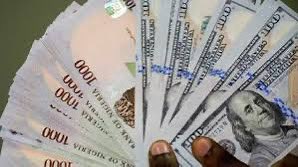By Adeyemi Adekunle
ABUJA—The Nigerian Naira has plunged to a new low of N1,660 against the US dollar in the parallel market, signaling intensifying economic challenges for Africa’s largest economy.
The sharp depreciation, reported on Friday, has sparked widespread concern over its implications for inflation, the cost of living, and the purchasing power of millions of Nigerians.
This latest decline comes amidst soaring demand for foreign exchange, dwindling dollar inflows, and restrained intervention by the Central Bank of Nigeria (CBN). Market experts attribute the situation to a convergence of domestic and global factors, including weakening investor confidence, reduced oil revenues, and lingering economic uncertainties.
The pressure on the local currency has been building for months, exacerbated by an increase in importation costs and the sustained outflow of capital. With the CBN opting for a hands-off approach in the foreign exchange market under its current liberalization policy, traders and businesses have turned to the parallel market to meet their forex needs. This has created a speculative environment where the naira continues to lose value rapidly.
Economic analysts warn that the persistent depreciation could have a domino effect on key sectors of the economy. Rising exchange rates directly impact import costs, pushing up prices of essential goods and services. Inflation, which already reached 26.72% in November, is expected to climb further as businesses pass on higher operational costs to consumers.
“Currency instability has a direct impact on consumer prices and erodes the purchasing power of citizens,” said financial expert Dr. Ibrahim Musa. “Unless immediate measures are implemented to stabilize the naira, the economic outlook will remain grim for both businesses and households.”
The situation is particularly challenging for small and medium enterprises (SMEs), which rely heavily on imported raw materials and equipment. Many are now struggling to stay afloat as the cost of production skyrockets. A Lagos-based importer of electronics, Mrs. Amaka Obinna, expressed her frustration: “Every time the naira falls, we have to pay more for goods, and customers are unwilling to pay higher prices. It’s a vicious cycle.”
The currency crisis has also affected the education sector, with parents and students facing increased costs for tuition and living expenses abroad. “We are paying twice what we used to for school fees and upkeep,” lamented Mr. Charles Okafor, whose son studies in the United States. “The situation is unsustainable.”
Despite these challenges, the federal government and the CBN have yet to unveil concrete steps to address the currency’s freefall. Critics argue that the central bank’s liberalized forex policy, aimed at unifying the official and parallel market exchange rates, has inadvertently fueled speculative activities.
Meanwhile, the situation continues to stoke fears among ordinary Nigerians already grappling with the rising cost of living. Basic commodities such as food, fuel, and transportation have become significantly more expensive, further stretching household budgets.
In response to the crisis, labor unions and civil society groups are urging the government to act swiftly. The Nigeria Labour Congress (NLC) has called for policies that will improve forex liquidity and stabilize the naira to cushion the impact on workers.
“Workers cannot keep bearing the brunt of economic mismanagement,” said NLC President Joe Ajaero. “The government must take decisive steps to halt this depreciation and implement measures to protect the livelihoods of Nigerians.”
Experts also highlight the need for a long-term strategy to reduce the economy’s dependence on imports. Nigeria’s heavy reliance on foreign goods has made it vulnerable to exchange rate fluctuations, with oil revenues—the country’s main forex earner—failing to provide sufficient dollar inflows due to production shortfalls and global price volatility.
“Diversifying the economy and promoting local production are critical,” said Dr. Bimpe Oyeleke, an economist. “While immediate stabilization measures are necessary, a structural shift towards self-sufficiency in key sectors is the only sustainable solution.”
On the streets, frustration is growing among citizens who feel the pinch of a weakening naira in their daily lives. “Every time I go to the market, prices have gone up,” said Mrs. Kemi Soneye, a mother of three in Abuja. “It’s getting harder to make ends meet, and there’s no end in sight.”
The private sector, too, is feeling the strain, with many companies reassessing their operations. Multinationals with exposure to the Nigerian market are wary of the unpredictability, with some reportedly considering scaling back investments. Local businesses, already burdened by high energy costs and infrastructure deficits, are finding it increasingly difficult to remain competitive.
As pressure mounts, stakeholders are urging President Bola Tinubu’s administration to prioritize economic stabilization in its policy agenda. The upcoming fiscal reforms and potential reorganization of the CBN are seen as critical opportunities to address the crisis.




